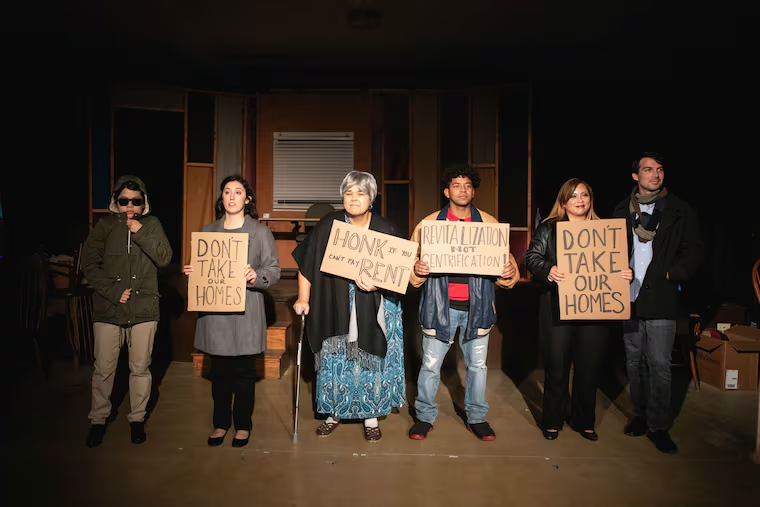In 'MinorityLand’ from Power Street Theatre, a look at gentrification and the impact of change
Six characters, mixing races, ethnic backgrounds, sexualities, and aspirations, feel the bite of rising rents and neighborhood destruction. Old deals with young, female with male, straight with gay, poet with premed, Asian with African American with white. Looks a lot like America.

On Friday night, the play onstage looked like America, as did the audience. Sounds of Spanish, English, and Chinese graced the pre-play air at West Kensington Ministry.
Corina Hierro (born in the Dominican Republic) and Jennifer Betancur (born in Colombia), two students from Esperanza Academy Charter School, began the evening reading poems about the idea of home. And playwright and codirector (with Cat Ramirez) Erlina Ortiz got up to welcome us.
Then began MinorityLand by Power Street Theatre Company. It runs through Oct. 5 at the West Kensington Ministry, and then Oct. 11-13 at Theatre Horizon in Norristown. Gentrification is the topic, specifically in North Philly, near a specific large university, and not too far from a specific community college.
It was a homecoming. MinorityLand was the first production (2013) ever done by Power Street — which founder Gabriela Sánchez calls a “womxn-of-color-led multicultural theatre company.” Back then, it premiered at Philly Fringe; this is its premiere at West Kensington Ministry.
Six characters, mixing races, ethnic backgrounds, sexualities, and aspirations, feel the bite of rising rents and neighborhood destruction. Old deals with young, female with male, straight with gay, poet with pre-med, Asian with African American with white.
The six endure difficult encounters as the situation worsens, the wrecking ball disappears their neighborhood, and they have to decide what to do.
Sánchez plays Mama Julia, the Mother Courage figure. She looks after the rest: Deb (simpatica Anjoli Santiago) and Otis, two mixed-race young adults who live next door; George (played at beautiful cross-purposes by Amy Boehly), best friend of Otis; and two white students, Amelia and Saxon, lodging (to Otis’ disgust) with Mama Julia to help pay her often-hiked rent.
Each white kid has a secret. (Mama Julia exclaims something like “Tantos secretos en mi casa!” “So many secrets in my house!”) Amelia, we’ll learn, is not as “white” as she lets on. As for Saxon, Otis sneeringly calls him a pajarito or “gay boy.” One of Mama Julia’s best jokes renders the meaningful name Saxon as Sazón, name of her favorite Goya seasoning mix.
If Mama Julia is the sun, Otis (played with smiling, naïve energy by Freddy Amill) is her closest orbital. Otis is the play’s through line: He resists change with all his might, circulating a petition, organizing a march. Above all, he’s trying to avoid growing up. The political is the personal; we adopt causes partly because of where we are in life.
Momentum builds; characters make mistakes, recover or don’t. Mama Julia sings, “Cambio, cambio, cambio”; Deb sings, “Change, change, change.” At the end, this little group, about to be dispersed to the winds, marches with placards down the street, chanting, “Change! Change! Change!”
This is neighborhood, low-budget theater — but everyone should see this play. Some aspects may be amateurish, but Ortiz’ nonjudgmental, good-hearted, nuanced, on-target vision carries the day.
You’ll see through many eyes. As Mama Julia says, “It’s not about who is right and who is wrong; it’s about who has the power.”
At the after-party, one playgoer said, rightly, that MinorityLand “gets to so much of the problem; so many voices get airtime. And,” she added, “I really wanted to know what happens to everybody. I want a sequel.” Hear that, Erlina Ortiz?
THEATER REVIEW
MinorityLand
Through Oct. 5 at West Kensington Ministry, 2140 N. Hancock St., then Oct. 11-13 at Theatre Horizon, Norristown. Information at powerstreettheatre.com; or for Theatre Horizon 610-283-2230, theatrehorizon.org